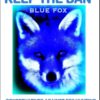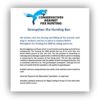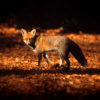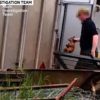blogs_entry.aspx?id=355 Please click on this link for short 3 minute video of a Goat Farmer who is unhappy with her local Hunt. Her goat livestock have aborted their young because of their distress of hearing the packs of hounds and she now feels she has no option but to sell her farm and move away.
More to hunts than misery to wildlife – With thanks from the Irish Council Against Bloodsports web site
Special report on the significant risks foxhunting poses to Irish farmers where fox hunting is still legal. The following information highlights the damage that hunts can do to Farmer’s land generally.
As the current foxhunting season continues, farmers should be warned about the serious risks to their livelihoods caused by foxhunters.
According to recent reports in the farming press, certain lamb plants in this country record more liver rejections caused by a worm that uses the dog as an intermediate host than are caused by liver fluke. We are warned that kennel dogs (hunt hounds, for example) can be a problem here.
The role of hunts in the spread of lamb diseases was exposed in a 1986 Veterinary Record report which outlined that a major factor in the rejection of lamb livers for human consumption is “parasite infestation from hunt hounds fed on uncooked meat and offal from farm casualties”.
The report stated that out of all the lamb livers examined, 97 per cent were affected. More than 60 per cent of these were partially or wholly rejected as unfit for human consumption.
Meanwhile, farmers are being urged to use a flukicide which kills fluke at all stages of its development in sheep and bovine. Are they being told, however, about the implications of thousands or millions of hoof prints left on land by mounted hunts? Hoof prints happen to be the favourite habitat of the snails which act as intermediate hosts to the liver fluke parasite.
Modern fertilised pastures are very vulnerable to poaching and not just when they are wet. Are farmers being reminded that poached or hoof-damaged pasture land results in a huge reduction in grass yield the following spring.
According to an article in the Irish Farmers’ Journal in April 2000: “Research shows that the more severe the poaching done in autumn, the bigger the yield reduction in the spring. Plots that had been severely damaged in the autumn produced over 70 per cent less grass the following spring compared to plots that were not damaged.”
To work out how severe the poaching by hunts can be, simply consider those trotting or galloping hooves and the weight of the horses, their riders and saddles.
Note also the advice given to sheep owners. Emphasis is put on the necessity of avoiding putting ewes under stress, especially by keeping dogs away from them. As we know, hunted foxes trying to throw hounds off scent, deliberately or instinctively run through flocks of sheep, herds of bovines and over fields covered in slurry. As Robert Churchward pointed out, sheep and bovines gallop wildly in panic in all directions at the sight of an approaching pack of hounds.
A slurry covered field is said to be “a huntsman’s nightmare” but only because the presence of slurry almost always causes the hounds to lose the scent of the fox. That the slurry can harbour infectious diseases does not cost the hunters a thought. Do they care about carrying disease from one farm to the next? In the course of a day’s hunt, more than 50 farm boundaries can be crossed.
A foxhunt spokesperson once said that they would strongly resist any attempt by farmers to charge the hunt for the use of their land. As John Webster wrote in his March 1970 Irish Times article ‘The Havoc of the Hunt’, huntspeople are “unique in demanding that others supply for free the most expensive item in their ‘sport’”.
The land stands not only as the most expensive item in hunting but the most valuable item for farmers. Which is why more and more farmers are carefully considering the issue of hunt access. The risk of hunt’s negatively impacting farm livelihoods is now more clear than ever. And farmers are responding.
Look out for all the preservation notices in the newspapers warning hunts to keep out. Some of you may have seen the large notice in the Limerick Leader in December signed by 60 landowners and stating that “hunting on horseback and beagle hunting is strictly forbidden on our lands.”
There is much, much more to hunting than the misery inflicted on our wildlife. Hunts spread disease and cause serious damage to grass, Ireland’s most valuable crop







